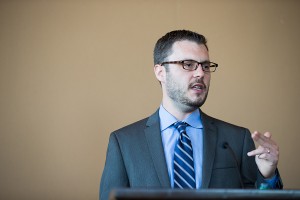 http://dailytrojan.com/2013/10/14/activist-breaks-down-the-israeli-palestinian-conflict/
http://dailytrojan.com/2013/10/14/activist-breaks-down-the-israeli-palestinian-conflict/
By YASMEEN SERHAN · Daily Trojan
Posted October 14, 2013 (1 week ago) at 11:27 pm in News
On Monday afternoon, USC’s Students for Justice in Palestine and the Political Student Assembly co-sponsored an event featuring author and activist Josh Ruebner.

Speak out · Josh Ruebner discusses his book Shattered Hopes: Obama’s Failure to Broker Israeli-Palestinian Peace Monday at the Campus Center. – Ralf Cheung | Daily Trojan
Ruebner, a former Middle East analyst for the Congressional Research Service and the current national advocacy director of the U.S. Campaign to End the Israeli Occupation, discussed his book, Shattered Hopes: Obama’s Failure to Broker Israeli-Palestinian Peace, which analyzes the Obama administration’s current policies on Israel and the occupied Palestinian territories.
Ruebner began the discussion by exploring the recent history of conflict resolution, from the French colonization of Algeria to the Protestant and Catholic communities in Northern Ireland.
“Why do I raise these historical conflicts at the outset of my talk?” Ruebner asked the crowd of approximately 20 students. “I raise them because we hear that the Israeli-Palestinian conflict is intrinsically and inherently more complex and difficult to resolve than other conflicts.”
Ruebner, however, said he disagreed with this sentiment.
“I don’t believe the Israeli-Palestinian conflict is inherently more difficult to understand or resolve than decolonizing Algeria or ending apartheid in South Africa or arranging for power-sharing in Northern Ireland,” he said.
Though the discussion began by recounting the history of the conflict to the presence of more than 5 million Palestinian refugees around the world today, Ruebner ultimately focused on the numerous attempts made by the United States to broker peace in the contested region. He also frequently likened the laws governing the area to apartheid in South Africa.
“The reason why this peace process fails, and will continue to fail, is because the peace process has not been about ending Israel’s apartheid policies toward the Palestinians,” Ruebner said. “Rather, it has been about enforcing them.”
In comparing the Obama administration’s approach to brokering peace negotiations to those of past administrations, Ruebner highlighted instances in which Obama broke from the United States’ traditional stance on the conflict, including his opposition to Israeli settlement expansion.
“There is no doubt that President Barack Obama has had more understanding of and empathy with Palestinians and Palestinian-Americans,” Ruebner said. “Hands down.”
Ruebner also noted instances in which Obama’s administration aligned with past administrations, including his decision to increase the amount of military aid to Israel from $2.5 billion to $3.1 billion and pursuing peace negotiations in light of recent Israeli settlement expansion. To Ruebner, however, such policies continue to make the United States a “dishonest broker” in peace negotiations.
“Under international law, when you provide weapons to one side of a conflict, you have broken the laws of neutrality,” Ruebner said.
In closing, Ruebner compared the United States’ continued policies toward Israel and Palestine to a definition of insanity.
“It brings to mind Einstein’s definition of insanity — which is to do the same thing over and over again and expect that somehow you’re going to get a different result,” Ruebner said. “You’re not. That’s why we will have failure this time around as well.”
Despite the less than optimistic conclusion to the talk, many students said they appreciated the clear presentation of the contested issue.
“I thought it was very informative,” said Sean McGuire, a senior majoring in international relations and economics. “He did a really good job of laying out the policies that each of these administrations have pursued and juxtaposing them with the Obama administration’s policies.”
To Students for Justice in Palestine President Ifrah Sheikh, the presentation allowed students to examine the Obama administration from a variety of viewpoints.
“I really liked how he broke down in very clear, concise and specific points what Obama has done in the region, both positive and negative,” Sheikh said. “It’s very easy to focus on the negatives and not always look at the positives of what they’ve done.”
